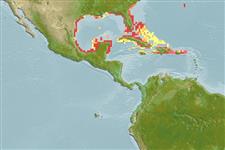Common names from other countries
Environment: milieu / climate zone / depth range / distribution range
экология
морской демерсальный; немигрирующий; пределы глубины 0 - 10 m (Ref. 52034). Subtropical; 33°N - 17°N, 99°W - 64°W
Western Atlantic: Bermuda, southern Florida (USA), Bahamas and the entire Gulf of Mexico.
Length at first maturity / Size / Вес / Возраст
Maturity: Lm 2.1 range ? - ? cm
Max length : 5.0 cm TL самец/пол неопределен; (Ref. 7251); наибольший возраст (опубликованны данные): 1.00 годы (Ref. 12238)
колючие лучи спинного плавника (общее число) : 0; членистые (мягкие) лучи спинного плавника (общее число) : 12.
Shallow grass flats, especially in association with Zostera and other seagrass; periodically found in floating vegetation. Diurnal, males more site faithful than females. Ovoviviparous (Ref. 205). The male carries the eggs in a brood pouch which is found under the tail (Ref. 205). Specimens lose their skin filaments in aquaria (Ref. 30915). Has been reared in captivity (Ref. 35420). Maximum depth reported taken from Ref. 128812.
Monogamous mating is observed as both obligate and genetic (Ref. 52884). Male carries the eggs in a brood pouch (Ref. 205). Female transfers all the eggs in the ovary to the brood pouch of the male (Ref. 1284).
Lourie, S.A., R.A. Pollom and S.J. Foster, 2016. A global revision of the seahorses Hippocampus Rafinesque 1810 (Actinopterygii: Syngnathiformes): taxonomy and biogeography with recommendations for further research. Zootaxa 4146(1):1-66. (Ref. 115213)
Статус Красного Списка МСОП (Ref. 130435)
Угроза для людей
Harmless
Использование человеком
рыболовство: не имеет хозяйственного значения
дополнительная информация
инструменты
Специальные отчеты
Скачать в формате XML
ресурсы в Интернет
Estimates based on models
Preferred temperature (Ref.
115969): 23.4 - 27.8, mean 26.6 (based on 229 cells).
Phylogenetic diversity index (Ref.
82804): PD
50 = 0.5000 [Uniqueness, from 0.5 = low to 2.0 = high].
Bayesian length-weight: a=0.00447 (0.00177 - 0.01127), b=3.00 (2.78 - 3.22), in cm Total Length, based on LWR estimates for this (Sub)family-body shape (Ref.
93245).
Trophic level (Ref.
69278): 3.2 ±0.5 se; based on size and trophs of closest relatives
устойчивость к внешним воздействиям (Ref.
120179): средний (среднего размера), минимальное время удвоения популяции 1.4-4.4 года (tm=0.4; tmax=1; assuming Fec=100 (approx. 3 generations/year)).
Fishing Vulnerability (Ref.
59153): Low vulnerability (10 of 100).
